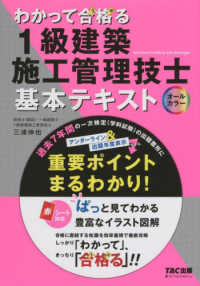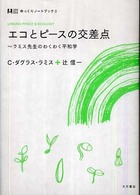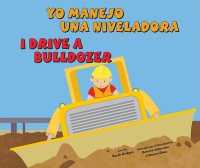- ホーム
- > 洋書
- > 英文書
- > Literary Criticism
Full Description
In Contending for the "Chinese Modern", Xiaoping Wang studies the writing of fiction in 1940s China. Through a practice of political hermeneutics of fictional texts and social subtexts, it explores how social modernity and literary modernity intertwined with and interacted upon each other in the development of modern Chinese literature. It not only makes critical reappraisement of some renowned modern Chinese writers, but also sheds fresh lights on a series of theoretical problems pertaining to the issue of plural modernities, in which the problematic of subjectivity, class consciousness and identity politics are the key words as well as the concrete procedures that it employs to undertake the ideological analysis. The manuscript signifies a new paradigm in studies of modern Chinese literature.
Contents
Acknowledgment
List of Figures
Introduction
1 Debates of the Origin of Chinese Modernity and Its Substance
2 Semicolonialism and Modernist Writing
3 Field of Cultural Production and Literature as Social Institution
4 The Problematic of Historicity and Political Hermeneutics
5 Fictional Writing in the Great Transformative Epoch of 1940s China
6 Chinese Modernity in Ordeal: New Culture, New Youth, New Women
7 Literary Modernity and Modernization of "Modern Chinese Literature"
8 Structural Outline
Part 1: Negotiating with the Nightmarish Modern
Introduction
1 General Cultural Production in the Occupied Area
2 Some Thoughts on the Origin of Modern Chinese Literature
3 Zhang Henshui's Early Efforts at Modernization of Chinese Fiction
1 Aborted Dreams of "New Women": Xiao Hong and Mei Niang
1 A Homeless Soul and a Misplaced Nostalgia: Exiled Experience and Xiao Hong's War-Time Diasporic Literature
2 Articulating the Disenchantment of Colonial Modernity: Mei Niang's Representation of the Predicament of Chinese New Women
2 Matrimonial Syndrome in a Besieged Society: Identity Complex in Eileen Chang's "Boudoir Stories"
1 Individualism in Crisis and Cultural Nihilism
2 Identity Politics and the Political Unconscious in Writing "Triviality"
Part 2: Rethinking the Disintegrated Modern
Introduction
1 The Restructuration of the Field of Cultural Production
2 The Diversified Writings of Fiction
3 Hu Feng's Theory of "Subjective Fighting Spirit"
3 Alienated Minds Dreaming for Integration: Constrained Cosmopolitanism in Wumingshi's and Xu Xu's "Modern Literati Novel"
1 Wumingshi's Middle Class Romance and "Anti-Bildungsroman"
2 Xu Xu's "Modern Tales of the Strange"
3 Conclusion
4 "Subjectivity" and Class Consciousness: Intellectual's Predicament and Lu Ling's "Neo-Leftist Stories"
1 Individualism and Aborted Bildungsroman: the Cultural Politics of Lu Ling's Stories in 1940s China
2 Politics of Recognition and Politics of Style A Reading of Children of the Rich with Hegel's Phenomenology of Mind
Part 3: Contending for a "New Democratic Modern"
Introduction
1 The "Cultural Field" of Yan'an, Its Political Economy and Production
2 Forging a New Cultural-Political Nation: from "Use of Old Forms" to "Establishment of a National Form"
3 Re-integration of Culture and Politics: a Re-Interpretation of Mao's "Yan'an Talks"
5 "Problem Stories" as Part of the "National Form": Rural Society in Transition and Zhao Shuli's "Peasant Stories"
1 Rural Society in Transition and the "Standing Up" of the Masses
2 The "Alternative Modernity" of the Storytelling and Its Paradox
6 From Feminist to Party's Intellectual? Identity (Trans-)formation and Ding Ling's "New Woman Stories"
1 From an Anarchist "New Woman" to a Cultural Worker for the Masses
2 Ambiguities and Contradictions in Creating a "New Revolutionary Culture"
Conclusion
References
Index








